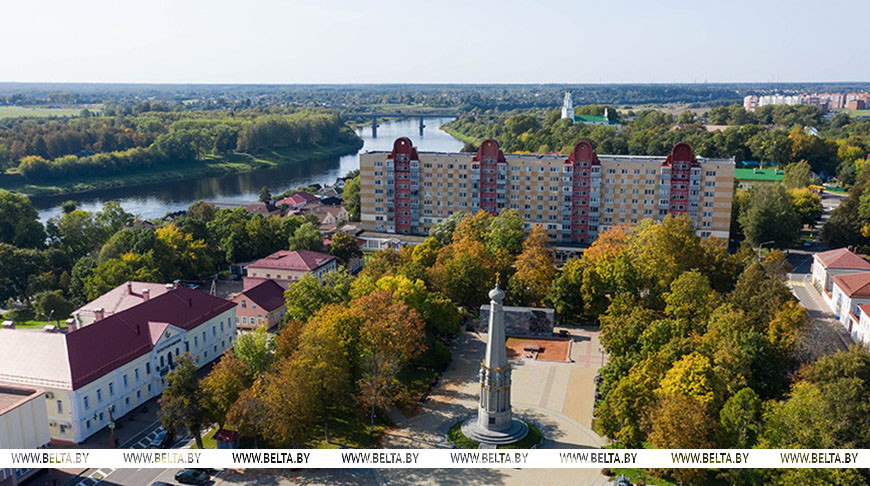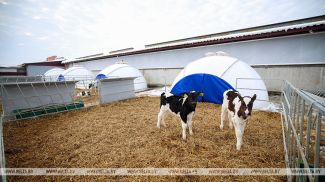
An archive photo
MINSK, 24 October (BelTA) – Belarusian President Aleksandr Lukashenko is scheduled to hold a meeting on sustainable development of Vitebsk Oblast on 24 October. The event was previously announced by Dmitry Krutoi, Head of the Belarus President Administration, during a report to the president on 22 October, BelTA has learned.
The president was briefed on a work plan that features substantive reports from the regional leadership on key sectors. The discussion also covered areas requiring ongoing oversight, including the implementation of decisions related to Vitebsk Oblast. These involve the work of integration structures, the agricultural industry and the manufacturing sector of the region, the situation at struggling enterprises, with the focus on the regional development program.
All these areas are under special control and will be discussed in detail on 24 October, Aleksandr Lukashenko said.
Following the report, Dmitry Krutoi shared further details with journalists. The meeting will also address livestock mortality and the measures to rectify the situation, not only in Vitebsk Oblast but nationwide. “The president probably wants to adopt a comprehensive decision now to finally resolve this problem as well,” he said.
The head of state is paying particular attention to the situation in the region, and there are a number of reasons for this. During his visit to Polotsk in 2024, which hosted the regional Dazhynki harvest festival, the president demanded that the leadership of Vitebsk Oblast thoroughly analyze the situation in each of its 21 districts and develop a clear, simple, and workable development program for each district, a kind of program for the revival of Vitebsk Oblast.
In the spring of this year, Vitebsk Oblast Governor Aleksandr Subbotin presented this document to the head of state. However, it turned out that the majority of the proposed measures were not properly developed. “As the president succinctly noted, it was essentially daydreaming and sent the documents back for revision,” Dmitry Krutoi said.
After almost six months, the revised program draft will be pitched again.
A thorough discussion of the document lies ahead, given the abundance of pressing issues in the region. In particular, the president pointed out that the region chronically fails to meet its key parameters for social and economic development. The gross regional product has consistently fallen short of its planned targets throughout the five-year period. The level of finished product inventory in warehouses remains one of the highest in the country.
Another important topic of the upcoming meeting is the region’s agricultural industry. Dmitry Krutoi recalled that back in 2016, at the insistence of the leadership of Vitebsk Oblast, which was then led by Nikolai Sherstnev, agricultural industry integration structures were established. A corresponding decree by the head of state was issued. “There were also many meetings and discussions at the level of our leader. He expressed very serious concerns and doubts,” Dmitry Krutoi recalled.
Initially, there were four such integration structures. However, in 2020, as part of a major adjustment to the decree, this number increased to seven. Today, six are operational. “We have a complete breakdown of their economic performance. In some aspects they have been successful. However, overall, the country’s leader is highly dissatisfied with the outcomes of their current work,” Dmitry Krutoi stated.
However, as of today, approximately 30% of the agricultural organizations that are part of the six integration structures are operating in the red. There is also debt overburden in the processing sector, which was forced to advance funds to these agricultural enterprises for carrying out agricultural work.
“Today, this tangled knot of problems and debts deeply concerns our leader. The draft document to be presented at the meeting essentially proposes a third stage of reorganization: instead of agro-industrial associations, we will create two meat and dairy holding companies. And once again, they request an additional package of state support, involving further installment plans, deferrals, or the writing off of fines and penalties for energy, for government guarantees, and a number of other areas,” Dmitry Krutoi said.
He stressed that the president is concerned with the question of how justified this is and who failed to fulfill their previous obligations. This is precisely what needs to be clarified at the meeting. While the president has been supportive of the proposals in principle, he has consistently warned that they must not be “spontaneous or temporary,” and that executives would be held personally accountable for their execution.
“If anyone wants to sit this out, it won’t work. I have a list of those invited, and everyone will be personally responsible for the decisions made,” the head of state noted in November 2019 at a meeting on the development of the agricultural industry in Vitebsk Oblast. “If you’re doing this just to get some room to breathe, then in a year there will be no air at all.”












